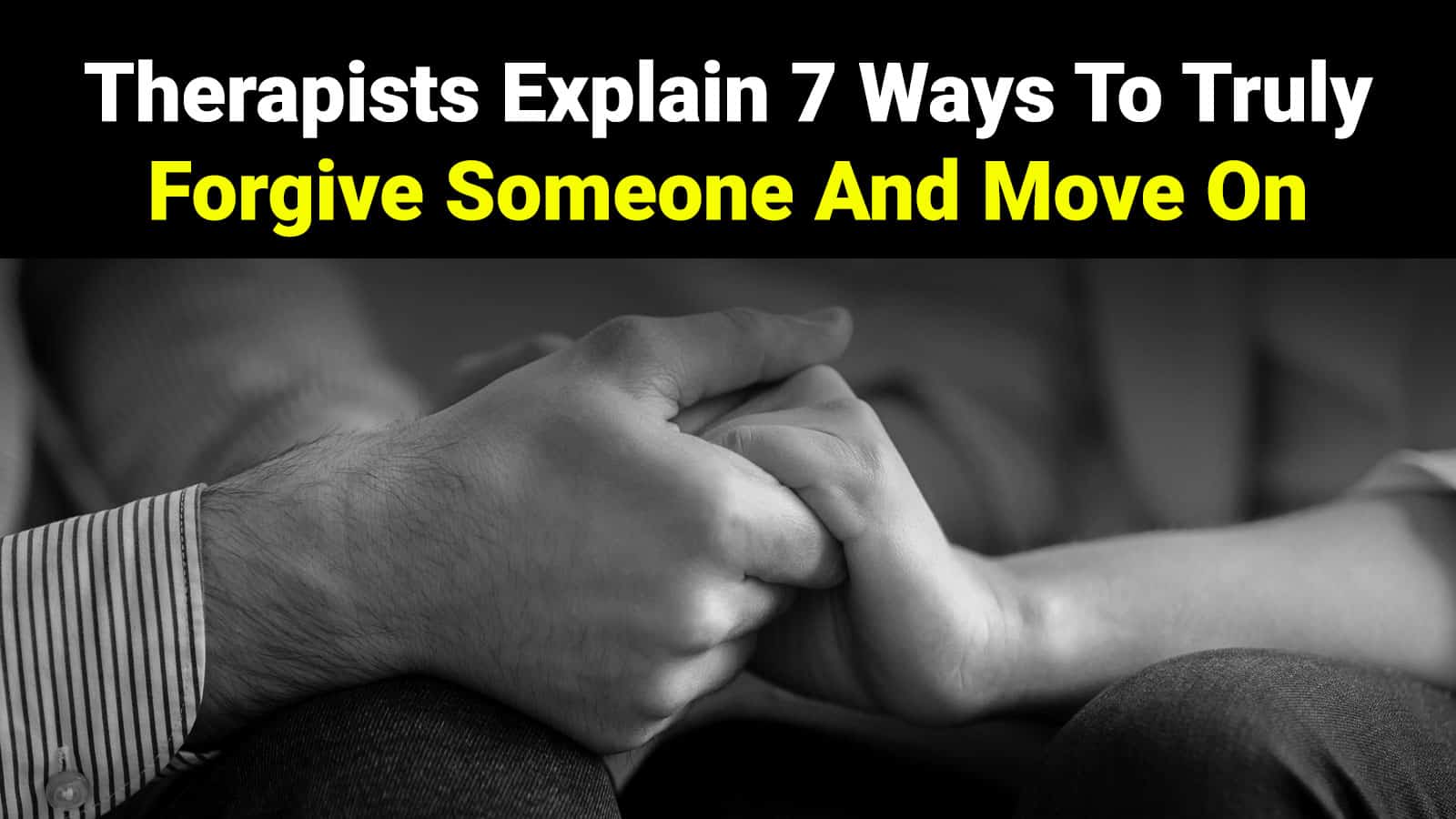When someone hurts you, it can feel like the world is ending. The betrayal shakes you to the core, and you don’t know how to respond. Weeks, months, or even years later, you still find yourself thinking about that person and how they hurt you. You want to forgive and let go of the past, but how?
Forgiving someone is easier said than done. There are a lot of aspects at play you may not have thought about. But you can learn to release your anger and step forward into a future without that burden.
Therapists Explain 7 Ways To Truly Forgive Someone And Move On
1. Want To Forgive
Forgiveness cannot be forced. If you don’t want to forgive those who have wronged you, you’re not going to be able to do it. You can fake it, but it won’t be genuine, and you won’t feel it in your heart or have the relief and closure that comes with it.
Of course, forgiveness is not mandatory by any means. If you don’t want to forgive someone who hurt you, and instead just want to move on and recover, that’s fine, too. But if you’re going to forgive someone, you have to really want to in order to begin.
Fundamentally, forgiveness is a choice. And it’s a tough choice to make, as you have to wrestle with yourself, your past, and your residual emotions. If you’re having trouble making that decision, you can encourage yourself by doing the following:
- Think of forgiveness as a gift to be given, not to others, but to yourself
- Consider whether you want to be held back or defined by the past
- Understand the fear and apprehension behind your reluctance to forgive
- Know that processing the anger attached to these situations will help you
- Try breathing meditation to calm your thoughts
Understand that you don’t have to forget about what someone has done – only find it in your hard to forgive
2. Let Yourself Feel And Process The Pain
A lot of times, what holds us back from achieving a state of forgiveness is our own fear. Forgiveness requires understanding and coming to terms with everything you have gone through, and this can be a harrowing experience. You may be frightened of revisiting the original emotions of hurt, betrayal, fury, or humiliation that came with the situation.
These are all valid feelings, but they are holding back your ability to forgive. In fact, studies have proven that bottling up emotions and refusing to confront them is far from a positive decision. It can lead to increased exhaustion and even aggression, which are both factors that affect your ability to forgive.
If you ever want to be able to move on, you need to be able to shed the strong emotions glued to you and your past. And the only way to do so is by processing the feelings and coming to an understanding about them. Only when you have done that can you find the ability to leave them behind in the dust.
There are more reasons to express your emotions, too. Medically speaking, bottled-up feelings have a number of awful side-effects, including:
- Worsened emotional struggle
- Blood pressure issues
- Depression and/or anxiety
- Memory problems
- Self-esteem decline
- Increased risk of cancer
- A shorter and less positive lifespan
To help you release your emotions, you can find ways to express them. You can do this by:
- Writing in a journal or diary
- Making art, such as songs, poems, stories, paintings, and more
- Talking to a trusted friend, family member, or therapist
- Moving around by dancing, running, jumping, or exercising in some way
3. Understand That Others May Be Trying Their Best
Some people genuinely are vindictive and manipulative, but a vast majority of people are not out to hurt those around them on purpose. Yes, people make mistakes, choose the wrong options, and do bad things, and those things are not excusable by any means – but it can help to see the intentions behind them.
Many people are simply trying their best to live their everyday lives. They are suffering their own pain, fighting their own journeys, and dealing with their own confusing desires and motivations. Understanding the reasons for someone’s actions can help you make sense of them, allowing you to move on. Were they:
- Trying to protect you?
- Trying to protect themselves?
- Caught in a misunderstanding?
- Dealing with personal issues and baggage?
Once again, we’d like to reiterate that this does not mean that adverse treatment is excusable, or that you should feel bad for the people who have hurt you. Even misguided good intentions cannot be accepted as useful for you. Instead, this is just a way to encourage more positive thinking, which can help you to see the humanity in others.
Often, we think of people who hurt us in an elevated way, giving their every action and word power over us because of our anger at them. Humanizing them can help bring the people who you want to forgive away from the supreme status they hold in your mind, so you can see them at your level – a person with flaws, just like you.
4. Speak It Into Existence
Sometimes, the best way to bring some change into your life is by speaking it into existence. You’d be surprised how much power verbalizing something can give you. By expressing your intentions out loud, you can literally make them a reality.
Sure, it’s a little more complicated than that. But at the heart of it, “fake it till you make it” is a big part of many difficult transitions in life. As awkward as it can be at first, the fact is that the more you tell yourself something, the more likely you are to believe it. (That’s why negative self-talk is so bad for you while positive affirmations work wonders!)
So say out loud that you’re forgiving someone, or say out loud that you’re moving on. You can also write these sentences out. Essentially, you’re using these statements as affirmations, and all you have to do is repeat them until you believe them. Some ideas of things you can say or write are:
- “I forgive you (insert person’s name).”
- “I am letting go of you (insert person’s name).”
- “You can no longer hurt me (insert person’s name).”
When you speak, open up your heart and genuinely envision those words and their potential outcomes. Imagine yourself free from this burden, and imagine yourself unshackling the weight from yourself. It takes practice, but you can do it!
5. Take Responsibility For Your Feelings
Other people can trigger negative emotions from you, yes. And, at the moment, someone who upsets you is responsible for their actions. But anytime after that, the responsibility falls on you to manage your emotions, overcome them, fester in them, or do whatever it is you want with them.
Let’s face it. Even after someone apologizes, emotions can still fester within one’s soul. Often, the remaining pain is due to a loss of control. You did not have the ability to stop yourself from feeling this way, and you certainly can’t control the actions of others, so you were, at that moment, powerless. It’s a frightening and hateful feeling, and it can make anyone upset for longer than need be.
Take a deep breath and become aware of yourself. Why did this elicit such a strong reaction out of you? Is it worth continuing to wallow in those emotions? Is there anything you can do to regain some control over the situation, likely by taking some of the responsibility? Maybe you can learn about your reactions, or about how to handle conflict, or anything similar.
Do note that this isn’t blaming yourself. This is putting control in a situation where you didn’t have it back into your hands. It’s an empowering process, and it may help you forgive and let go.
6. Build Stronger Boundaries
Many times, when someone hurts you, it teaches you something about the relationship – whether platonic or otherwise – that you didn’t know before. This can inform all your future interactions with that person, and it allows you to reassess your boundaries with them. These boundaries may be:
- Avoiding crossing certain lines
- Drawing new lines
- Changing the way you contact each other
- Removing certain aspects of your relationship with them
- Temporarily halting contact while you both process and recover from the emotions
- Cutting off contact entirely, permanently
In addition, you will learn and grow from this and better understand how to set boundaries with all future relationships. This is not saying you should become closed off. Instead, it’s about learning how to establish definite boundaries that allow you to trust and be close to those you care about without causing an unhealthy relationship imbalance.
In the case of familial relationships, setting boundaries can be extra hard. But stand your ground. This is about you and your health and wellbeing. Compromise can happen, but at the end of the day, what you’re comfortable with is not up for debate.
7. Understand That It’s A Process
Forgiving someone sounds so easy, but it isn’t. You need to keep your positive thinking going through what could very easily be a long and arduous process. That’s why you always have to remember that what you’re doing isn’t meant to be instantaneous. It’s a process of healing and recovering, with ups and downs, steps forward and back, and moments of weakness and strength.
It’s okay that it takes you a while to forgive someone who wronged you. It’s okay that sometimes you catch yourself slipping back into bad old habits of self-blame and aggression. Own up to these slip-ups, apologize to anyone caught in the crossfire, and get back to work. Start again. Climb back up.
It takes time, but these sad and upsetting experiences are instrumental for the growth of many, many people. If you let them, they can help improve your overall life, your relationships with others, and how you regard yourself. It’s a difficult journey, but it’s all worth it.
Final Thoughts on Learning to Forgive
Forgiving someone can feel like a constant uphill battle, especially if that person very severely hurt you. But all is not lost. Remember to stay strong and fight on. You can and will recover with positive thinking!















 Community
Community

